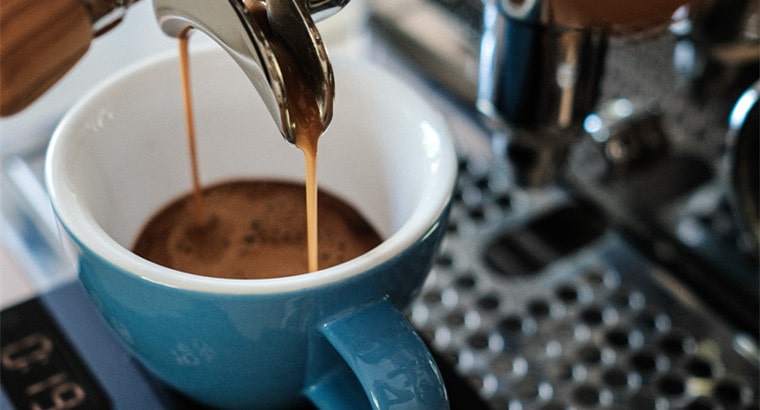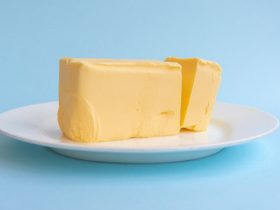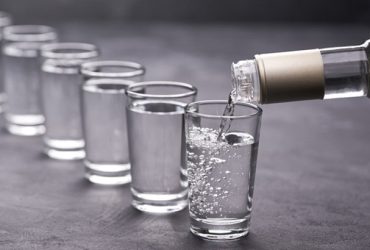Perhaps all you need to wake up and lift your mood in the morning is a delicious cup of espresso. While here, why don’t you take a look at Atlas coffee club, they offer coffee subscription services that curate some of the world’s best coffees especially for you. But when it comes to caffeine consumption — how many shots of espresso is too much for the average person?
An espresso’s size may tempt real coffee lovers to drink more than a few cups of it every day. For some, this might not be a problem, especially if they’re used to caffeine and all its glorious effects. Others, however, need to be extra careful and pay close attention to their caffeine consumption to avoid an overdose!
Espresso vs. Coffee: What’s the Difference?
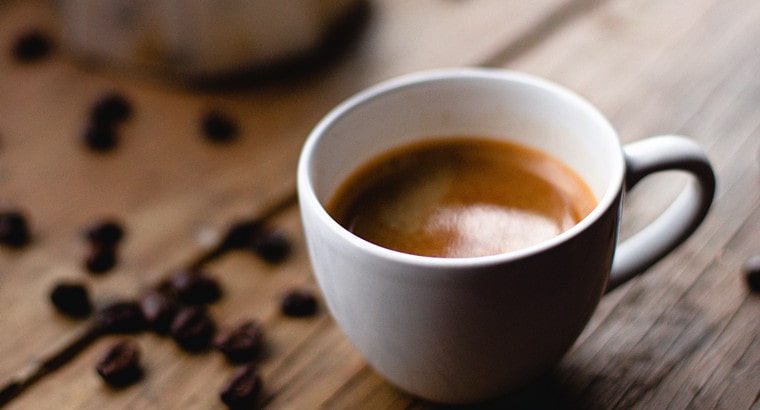
The espresso vs. coffee debate divides coffee drinkers around the world, with each party claiming their preferred choice is better. Don’t forget, though, that both types of coffee are made from the same coffee beans and are thus more like siblings than real competitors.
But there are some clear distinctions you should be aware of, especially if you mainly drink them for the caffeine. The main differences that give each type a separate set of qualities are those linked to brewing, taste, aroma, acidity, strength, and caffeine content.
1. Brewing Process
As espresso literally stands for “express,” it has long been a fan-favorite of coffee drinkers in a rush who need their fix in mere seconds. It takes only about 25 seconds to brew a 1-ounce shot using pressurized steam or boiling water that is sent through the coffee grounds.
In contrast, regular coffee may take as many as five minutes. You also make it by pouring hot water over ground coffee beans.
2. Beans
Technically speaking, both espresso and regular coffee entail using the same beans, usually Arabica or Robusta. However, espresso beans are roasted for longer, thus giving the coffee a stronger flavor.
With regular coffee, you can choose light, medium, and medium-dark roasts. Espresso beans, though, are often left to roast past the second crack. This gives espresso a much deeper, toastier, and less acidic flavor (since roasting the beans for longer eliminates some of the acidity).
3. Grind
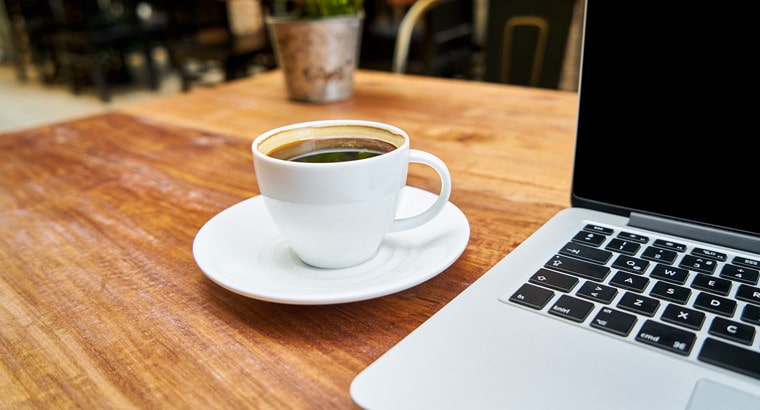
Since you need to push pressurized hot water through espresso grounds to get an espresso, these grounds have to be very fine and tightly packed. The water will only be in contact with them for a few seconds, so it’s necessary for them to be as tiny as sand to achieve the best (richest) flavor.
4. Strength and Caffeine Content
Espresso has a much bolder taste than brewed coffee, so people usually think it has more caffeine than its counterpart. However, that’s not necessarily true if you take into account the regular serving sizes.
If you only consider caffeine concentration, espresso has more caffeine overall. A single shot usually contains about 63 mg of the stimulant. A 2-ounce serving size would then provide you with around 126 mg.
But that may be still less caffeine than what regular coffee offers. To compare, a standard 8-ounce cup of brewed coffee can have anywhere from 70 up to 185 mg of caffeine.
A serving of espresso can also have less caffeine than a cup of coffee because the beans lose some of it due to a longer roasting time. Still, since espresso is more concentrated, you may need to drink fewer cups to achieve the same level of alertness regular coffee provides.
5. Nutrients
Coffee beverages are full of various nutrients and antioxidants, but espresso has the advantage here. The brewing method can impact the mineral content in your coffee drink. A study even showed that espresso shots are richer in zinc and calcium when compared to other types of brewed coffee.
Espresso may be a better antioxidant source since you have to grind the beans just before you pull a shot. Drip coffee usually calls for the use of pre-ground beans. These often sit in your kitchen cupboards for months on end. Consequently, they can lose their antioxidant potential with each passing day.
That said, regular drip coffee beats espresso in terms of chlorogenic acid content. As you can use any beans to make drip coffee, you have a selection of roasts to choose from (unlike with espresso, where there is a preference for a longer roasting time).
A study showed that light-roast coffee extract has a higher chlorogenic acid content in comparison to other types of roasts. This suggests that lighter roasts may impart additional health benefits, as chlorogenic acid is famous for its antioxidant and anti-inflammatory activity, ability to lower blood pressure, encourage weight loss, and more.
6. Calories
Finally, there’s a difference in calories too. A standard serving of espresso (2 fluid ounces) contains about 5.4. An 8-ounce cup of brewed coffee has only 2.4 calories.
Obviously, neither option should make you gain too much weight, provided you don’t add anything to them. It’s the add-ins like cream, sugar, and various syrups that you should worry about; calories from those easily make a coffee beverage a less healthy choice overall.
For instance, a Venti (24 fluid ounces) Java Chip Frappuccino® from Starbucks offers a whopping 145 mg of caffeine. But all those chocolatey add-ins, creamers, and sauces make it a calorie bomb. With each cup, you’d ingest about 560 calories, which easily equals some people’s lunch or dinner!
Are There Any Health Benefits to Drinking Espresso?

Many people begin their mornings with a shot (or few!) of espresso, hoping to wake up quickly enough to start their day on the right foot. Espresso, however, isn’t just an energy-building drink; its numerous health benefits definitely inspire more respect toward it.
1. Long-Term Memory Improvement
Yes, getting a few shots of espresso into your system will keep you alert and focused for longer. With constant use, though, espresso may improve your memory as well, allowing you to recall past events with more ease and confidently relay them either to yourself or to others.
If you’re eager to boost your long-term memory, drink about three or four cups of espresso a day, which equals about 200 mg of caffeine. However, make sure to change your lifestyle as well to generate better results. Getting enough sleep and rest at night, as well as daily exercise can also boost your memory.
Long-term memory benefits go hand in hand with dementia prevention too. Though the research is still scarce, some of it suggests that a higher intake of caffeine could keep cognitive decline, dementia, and/or Alzheimer’s disease at bay. The effects aren’t fully understood yet, but they may be linked to increased insulin sensitivity.
2. Improved Digestion
You probably already know that a cup of regular coffee could make that morning trip to the bathroom a bit easier on you. Espresso comes with that same benefit. Essentially, it gets things moving in case your digestive system has slowed down for some reason, thus allowing for quicker excretion.
Make sure, though, that you don’t overdo it with your espresso shots. If you drink more than an average human can safely handle (usually more than four cups a day), you may actually upset your stomach and spend more time in the bathroom than you planned.
3. Better Focus
Apart from waking up your brain and body, your daily shot(s) of espresso can also boost your focus. When used in moderation, this stimulant can positively impact the body’s central nervous system and the brain’s production of dopamine.
Dopamine is actually the neurochemical that controls your ability to not only focus but to maintain the necessary levels of concentration. Among other things, this may help you finish your tasks quickly and without investing an obscene amount of mental effort.
4. Healthier Liver
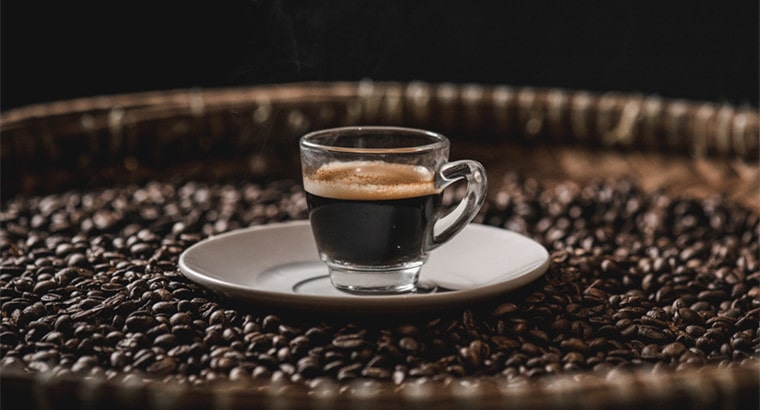
Strangely enough, higher doses of caffeine can positively impact your liver and, in some cases, even prevent some more serious diseases, such as cirrhosis.
Studies have shown that caffeine lovers are at a lower risk of developing liver cancer, fibrosis, and fatty liver disease. Plus, even if you already suffer from these diseases, espresso may help slow them down, provided you drink about one to three cups a day.
And how does coffee do this? It all comes down to how humans digest caffeine. During the digestion process, a chemical called paraxanthine is made. This particular chemical is the MVP of slowing down the scar tissue growth fibrosis is known for.
Two other chemicals, kahweol, and cafestol may also help fight cancer, in particular, hepatocellular carcinoma. And don’t forget about the acids found in coffee; these may alleviate or otherwise fight against conditions like hepatitis B.
5. Weight Loss, Decreased Hunger, and Better Athletic Performance
Downing an espresso an hour or so before your workout could help you perform better at the gym. That single shot of caffeine may be enough to increase your overall endurance at the gym. At the same time, it can improve your athletic performance, giving you more energy to do multiple exercises.
Even better, drinking espresso can help you lose weight in general. It contains some fiber, albeit not as much as you’d get from grains or leafy greens. Nevertheless, that amount of fiber should be enough to keep you satisfied for a few hours and avoid hunger pangs between meals.
Both of these benefits contribute to greater weight loss. Keep in mind, however, that you shouldn’t replace regular meals with coffee alone. Consume a moderate number of espresso shots a day to help yourself control hunger and excessive snacking.
Better still, don’t add sugar or cream to your daily cups to avoid accidentally ingesting more calories than you burn.
6. Better Mood
Too much coffee — or rather caffeine — can bring about more stress and anxiety than you’d expect. In moderate amounts, espresso can have a more positive, almost opposite effect. Certain research, albeit very limited, has shown that women, in particular, may benefit greatly from their coffee consumption.
7. Improved Immune System
Apart from giving you the energy and focus needed to complete your daily tasks, a cup of espresso may also help improve your immune system. This effect boils down to coffee beans being full of antioxidants.
Inadequate levels of antioxidants in the body lead to various problems, including premature aging, heart disease, and cognitive decline disorders. Your coffee addiction could actually help you stay away from these conditions, all thanks to the antioxidants found in coffee, which fight oxidative stress and free radicals.
8. A Lower Chance of Getting a Range of Diseases
Drinking espresso can also help prevent various serious diseases. Research has shown that there is a correlation between better cardiovascular health and coffee consumption. Espresso can also be a potent stroke preventative since it has a high mineral and oil content.
Antioxidants found in coffee are able to reduce the risk of developing cancer, in particular, colorectal and prostate cancers. As the beverage contributes to weight loss, there is a link between type 2 diabetes and coffee too.
Along with the fiber that prolongs the feeling of satiety between meals, coffee antioxidants can reduce inflammation, thus protecting you against the disease.
But if you already have type 2 diabetes, you may find it hard to control your blood sugar if you enjoy more than the recommended amount of caffeine a day. Insulin sensitivity is already low in those with type 2 diabetes. Therefore, drinking excessive amounts of coffee may actually have a negative effect and lower the sensitivity further.
Finally, caffeine may also play a role in reducing your chances of developing gout, a form of arthritis. You have to follow a few simple rules, though, if you want to take advantage of this particular benefit.
For one, you may be able to reduce gout risk by consistently drinking coffee. If you’re only a binge drinker, that may actually have the opposite effect and lead to frequent gout attacks.
Furthermore, it is best to go for unsweetened coffee beverages if you’re aiming to avoid gout in the first place. Even just one sugary drink a day puts you more at risk from gout in comparison to those who very rarely enjoy sweetened beverages.
How Many Shots of Espresso Is Too Much?
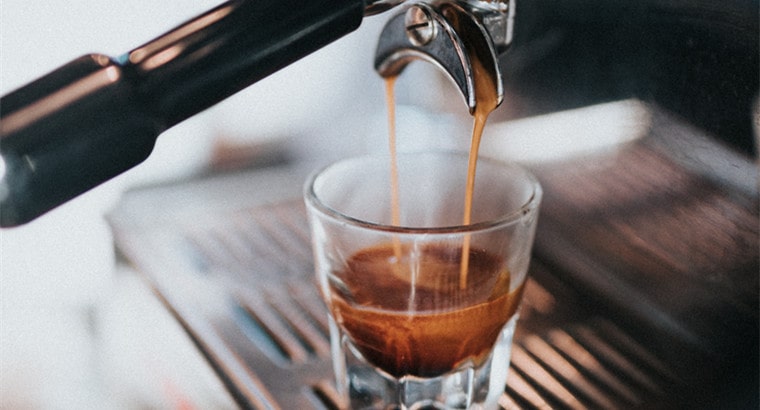
With such a huge number of health benefits, espresso seems like the perfect beverage for prolonging your life. Higher coffee consumption may even contribute to a lower mortality rate. So, you could technically say that every shot you consume might be a life-saver.
Nevertheless, there is a limit to espresso’s health benefits and the number of shots you should consume every day.
According to the FDA, 400 mg of caffeine a day is safe for most healthy adults. If you take into account that every shot of espresso has about 63 mg of caffeine, that translates to about six shots on a daily basis.
The problem with this assumption is that it cannot apply to everyone. Different people metabolize caffeine differently, and some may be more sensitive to the compound and its effects. Six shots of espresso may be too much for some people to handle and could trigger serious side effects.
Thus, the best course of action is to always listen to your body. If you feel bad because of your daily espresso consumption, simply lower your intake or switch to decaf.
What Happens If You Drink Too Many Shots of Espresso?
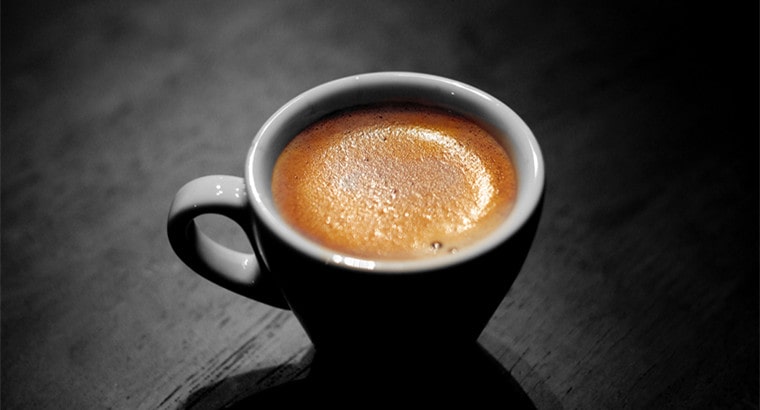
1. You Will Probably Be Very Thirsty and Experience Frequent Urination
If your caffeine consumption is through the roof at some point, you may sense that you’re feeling increasingly thirsty as time goes by. Strangely enough, this mostly applies to casual coffee drinkers. They may experience excessive thirst after just one cup.
Those who have a moderate daily caffeine intake may not feel so thirsty all the time. One study even revealed that if you’re used to caffeine overall, the coffee may have some similar hydrating properties to water and thus fail to cause excessive thirst.
Nevertheless, caffeine is a type of diuretic, so it will increase urine production, making you visit the bathroom more often. The compound is able to boost blood flow to the kidneys, which influences blood filtering and salt and water reabsorption. So, it can promote early urgency and urination frequency.
Frequent urination may not be a problem for some people, but it could become one for those with overactive bladders. Besides that, frequent urination makes the body lose nutrients too, which can negatively impact one’s health. Excess caffeine can cause a loss of crucial vitamins and minerals like B12, potassium, magnesium, and calcium.
2. You May Get a Headache
The reason coffee works so well for you in the morning is that it is a psychostimulant that targets your central nervous system. However, drinking too many cups of espresso a day can result in strong headaches.
It’s pretty clear why this happens; since coffee makes you urinate a lot, it can also cause dehydration, which, in turn, causes headaches.
Surprisingly enough, even stopping or lowering your coffee intake all of a sudden may contribute to painful headaches. Drinking coffee narrows blood vessels, so when you suddenly stop, they begin to open up and increase brain blood flow. Your brain will take some time to adjust to this sudden change, so you may experience withdrawal headaches.
3. You’ll Likely Have Trouble Sleeping
If you want to stay alert, you have to keep drinking coffee so as to maintain optimal energy levels. But if your caffeine consumption only escalates once a week, you may feel extremely fatigued the next day.
This is called rebound fatigue and is actually easy to avoid if you simply maintain your daily caffeine intake every day. However, doing so may put you at risk of experiencing other side effects, like insomnia.
Yes, the point of those few extra shots of espresso you drank is to keep you alert. But once bedtime rolls around, you may find it difficult to actually fall asleep, thus starting a vicious cycle of excessive caffeine consumption and insomnia.
A higher caffeine intake affects how long it takes you to fall asleep and even the amount of sleep time you get each night.
Ingesting lower or moderate levels of caffeine on a daily basis shouldn’t cause this issue. Better still, if you’re a regular coffee drinker, your body will adjust to caffeine’s effects over time and build a tolerance to it.
Essentially, if you want to drink coffee but avoid some of the major side effects — make sure you drink the same (moderate) amount every day.
However, always make sure not to drink too much coffee closer to bedtime. No matter if you’re a casual drinker or not, caffeine takes a few hours to wear off. Its elimination half-life ranges anywhere from 1.5 to a whopping 9.5 hours!
4. You May Feel Anxious
The great thing about caffeine is that it wastes no time increasing your alertness and focus. The compound blocks adenosine’s effects, which slows down neuron activity and makes you sleepy.
On top of that, caffeine causes neural excitation, which, in turn, encourages the pituitary gland to release more adrenaline. The brain perceives this excitation as an emergency; consequently, it releases the one thing that’d help you protect yourself in a fight-or-flight situation.
As fantastic as this all sounds, though, it can get problematic if your espresso consumption is through the roof. It has been shown that large amounts of caffeine may trigger anxiety and consequently even impair fine motor control.
Still, these effects aren’t likely to appear in individuals who drink normal amounts of coffee or aren’t so sensitive to caffeine.
5. You’ll Be Irritable
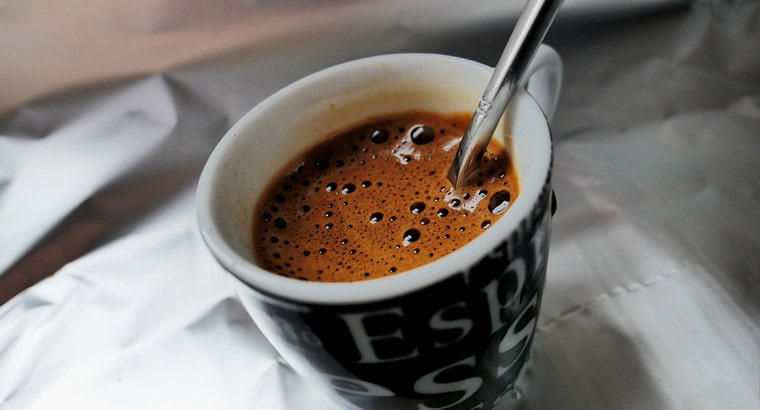
Coffee consumption can, at times, lead to a damned-if-you-do, damned-if-you-don’t situation. In simpler terms, if you’re a regular coffee drinker, you may become irritable if you haven’t had your daily fix. At the same time, you may experience irritability if you’re drinking more cups than you need on a daily basis.
The worst part is that irritability may be even more pronounced if you have some psychological or anxiety disorders, even if your coffee consumption is below average.
Therefore, if you’ve found that your daily cups of espresso dampen your mood quickly, perhaps it would be a good idea to evaluate whether you can cut back on caffeine for a while.
6. You May Get Addicted
Caffeine is notorious for its habit-forming qualities, so it’s no surprise that you can also get addicted to coffee. The compound doesn’t have the same addicting features as most drugs do (like cocaine, for instance). It can still cause dependency, though, especially if you’re used to large doses.
As a caffeine addict, you may experience extreme cravings and feel as if you cannot function without your daily cup(s) of joe. Withdrawal symptoms may occur as well; you may get a headache and feel very fatigued if your consumption suddenly plummets.
7. Your Heartbeat Will Increase, and You May Get Chest Pain
Rapid heart beating and subsequent chest pain are also well-known side effects of caffeine that may get even worse if you lose control over your caffeine consumption. In case of extreme doses, there’s a chance you will develop atrial fibrillation — an irregular and usually very rapid heart rhythm that can contribute to blood clots in the heart.
Luckily, this doesn’t happen to everyone. It has been shown that some people tolerate caffeine so well that they don’t experience an increased heart rate even when their heart health is already jeopardized.
Still, if you notice some changes, listen to your body and try to cut back to avoid any potentially more serious problems from occurring. Chest pain can also be caused by acid reflux, so you may not be so sensitive to caffeine but should still consider lowering your daily intake.
8. You May Experience Digestive Issues
Caffeine can get things moving in the morning due to its laxative effects that encourage the release of gastrin. Gastrin is a hormone that naturally speeds up your colon’s activity, letting you get rid of waste more easily.
However, caffeine may also be linked to an increase in peristalsis — a series of wave-like contractions that push food through your digestive tract. Consequently, it may loosen your stool and cause diarrhea if you’re ingesting too much caffeine every day.
9. Your Blood Pressure May Surge
Elevated blood pressure is a serious threat to your health and puts you in danger of experiencing a stroke or heart attack. Though caffeine doesn’t increase the risk of stroke or heart disease in and of itself, it inevitably raises your blood pressure.
Over time, high blood pressure can cause major damage to arteries and restrict your blood flow, which can, in turn, cause a stroke or heart attack. The effects are more pronounced if your caffeine intake is already high, during exercise, or in people with already elevated blood pressure.
The good news, however, is that this effect is usually temporary and may not even impact you so much if you’re a regular coffee drinker.
10. Your Muscles May Start Breaking Down
Finally, since caffeine can contribute to the development of rhabdomyolysis, a higher intake may put you at risk for kidney failure and various other issues.
Rhabdomyolysis is a syndrome that’s a consequence of muscle fiber death and its inevitable release into the bloodstream. It is usually caused by injuries, long-lasting muscle compression, burns, lightning strikes, electrical shock injuries, and snake or insect bites and venom.
However, research shows that ingesting a high amount of caffeine in a short period of time can also trigger it. This is especially true for individuals who either aren’t used to caffeine or are too sensitive to it.
Could Espresso Actually Kill You?
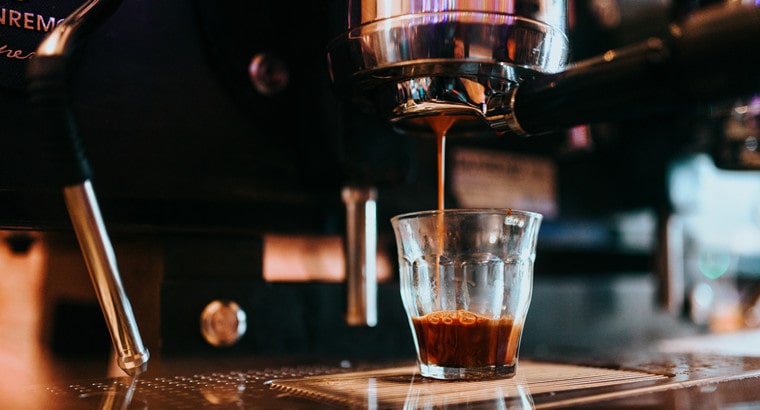
As you can safely drink around six espresso shots a day and still feel fine, you’d think that anything above that number could harm you more seriously. However, caffeine tolerance is different for everyone and usually depends on your overall sensitivity, what you’ve eaten, and even your weight.
Just like with most things in life, any sort of excessive behavior can result in serious health problems and even death. The same goes for caffeine, which could kill you if you ingest anywhere between 5 and 10 grams of it.
Since espresso shots are measured in milligrams, this equals 5,000-10,000 mg, or up to 159 shots of espresso (since one shot usually offers about 63 mg of caffeine per ounce).
The thing is, caffeine intoxication is an unlikely scenario simply because your stomach cannot hold more than 135 ounces of fluid at a time. Your bladder holds even less than that — about 18 ounces of urine when it is completely full.
So, it’s unlikely you’ll be able to hold that coffee inside you for too long. You will have to go to the bathroom long before the intoxication even occurs. Besides that, you will most likely experience nausea and vomiting in the meantime, which would prevent you from getting even more coffee into your bloodstream.
But you don’t have to sip on coffee to get caffeine. You may also experience intoxication if you take too many caffeine pills. This may be followed by many uncomfortable symptoms, including:
• Headache
• Fever
• Increased thirst
• Diarrhea
• Dizziness
• Insomnia
• Irritability
• Trouble breathing
• Confusion and hallucinations
• Irregular or fast heartbeat and chest pain
• Convulsions
• Uncontrollable muscle movements
How Do You Treat a Caffeine Overdose?
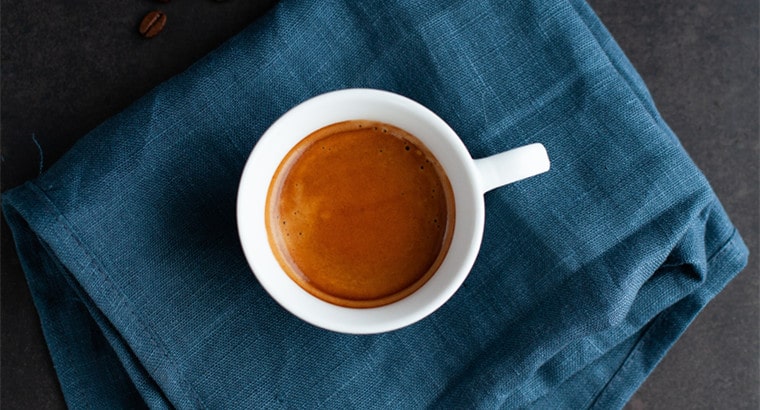
In case you’ve gone too far with your espresso or have otherwise ingested too much caffeine, your doctor is likely to try easing your symptoms while getting the caffeine out of your system. Activated charcoal is a good choice for this, as it can prevent the compound from going to your GI tract.
If caffeine has already gotten to your digestive tract, the best solution is to take a laxative or to literally wash the contents out of your stomach with a tube (gastric lavage). Gastric lavage, or stomach pumping, is a common procedure used to eliminate drugs, alcohol, and various poisons from the body.
It’s not the most comfortable method, however, and can put you at risk of a range of complications, such as aspiration pneumonia, minor bleeding, vocal cord spasms, and more.


